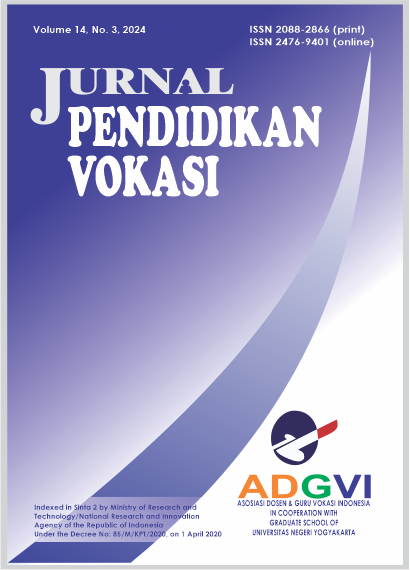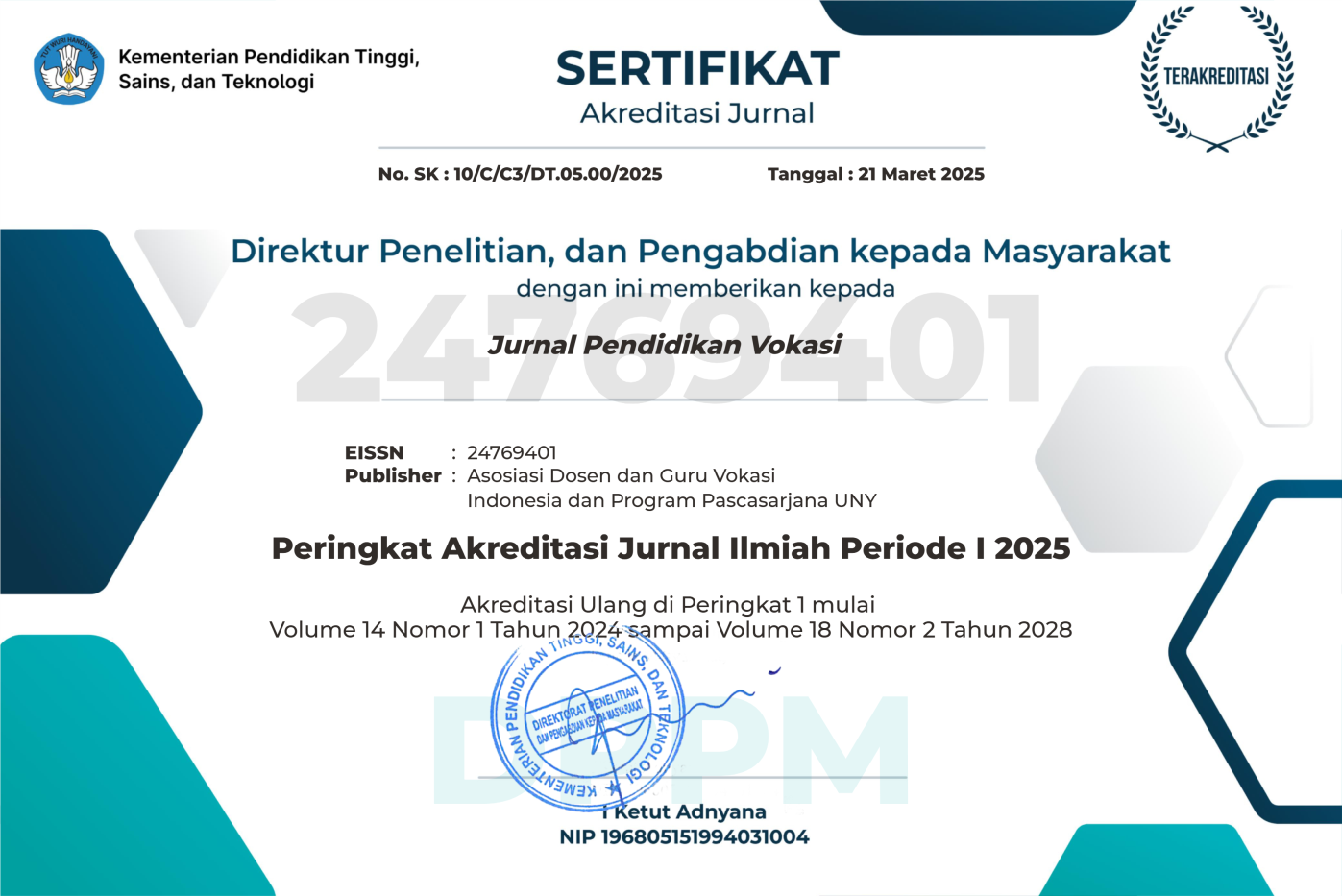The effect of Intelligence Quotient (IQ) and Adversity Quotient (AQ) on soft skills competency development in maritime vocational education
DOI:
https://doi.org/10.21831/jpv.v14i3.78050Keywords:
Adversity Quotient (AQ), Intellectual Intelligence (IQ), Cadets, Maritime Education, Soft SkillsAbstract
This research aims to determine the effect of intelligence on soft skill competence and to analyze models predicting improvements in soft skill competence based on intelligence in maritime vocational colleges under the Ministry of Transportation, which is responsible for producing seafarers in Indonesia. This study employs a quantitative and inferential approach to test the hypothesis. Data were collected from 217 prospective graduates at the Politeknik Pelayaran Surabaya, Indonesia. The sampling technique used is stratified cluster random sampling, selecting samples from three majors: Nautical, Engineering, and Electrical. The instruments used in this research include standardized tests and a questionnaire, both of which have been tested for validity and reliability. Data analysis was conducted using Partial Least Squares (PLS) with Smart PLS software to examine the structural relationships among variables and produce a predictive model of soft skill competence based on intellectual intelligence (IQ) and Adversity Quotient (AQ). The results of this study indicate a significant and positive direct influence of IQ on soft skill competence by 50% and an indirect influence of IQ on soft skill competence through AQ by 6.8%. The analysis further reveals a positive and significant influence of IQ on AQ by 21.4% and a direct positive influence of AQ on soft skill competence by 31.8%. The structural analysis of the model using PLS demonstrates that IQ and AQ together influence soft skill competence with an overall predictive power of 44.9%. This research contributes to understanding the relationship between intelligence and soft skills development, which can serve as a foundation for formulating maritime vocational education policies. The findings highlight the importance of integrating both cognitive intelligence and resilience-building strategies into maritime education curricula to enhance the preparedness and employability of future seafarers.
References
Al-Mamary, Y. H., & Alshallaqi, M. (2022). Impact of autonomy, innovativeness, risk-taking, proactiveness, and competitive aggressiveness on students’ intention to start a new venture. Journal of Innovation & Knowledge, 7(4), 100239. https://doi.org/10.1016/j.jik.2022.100239
Almat, N. S., Aliya, M. S., Zhanna, U. T., & Gulmira, D. S. (2023). The relationship between social intelligence and IQ: A psychometric analysis. The Open Psychology Journal, 16(1). https://doi.org/10.2174/18743501-v16-e230120-2022-78
Anderson, J., & Rainie, L. (2018). Artificial intelligence and the future of humans. https://www.pewresearch.org/internet/2018/12/10/artificial-intelligence-and-the-future-of-humans/
Arifin, S., Pratama, D. P. A., & Utomo, P. (2023). Pengantar statistika: Teori dan metode ekonomi terapan. CV. Pena Jaya Pers. https://www.researchgate.net/publication/373449432_FULL_PAPER_PENGANTAR_STATISTIKA_Rev-1-50
Bali, M. M. E. I., Kumalasani, M. P., & Yunilasari, D. (2022). Artificial intelligence in higher education: Perspicacity relation between educators and students. Journal of Innovation in Educational and Cultural Research, 3(2), 146–152. https://doi.org/10.46843/jiecr.v3i2.88
Beutell, N. J., Abarca, N., & Majluf, N. (2021). The soft skills for human centered management and global sustainability (M.-T. Lepeley (ed.)). Routledge. https://doi.org/10.4324/9781003094463
Capunitan, K. B., Lirado, J. D., & Gregana, C. F. (2023). Motivational factors in science learning, learner’s satisfaction and learning outcomes of pre-service teachers. International Journal of Scientific and Management Research, 06(05), 72–115. https://doi.org/10.37502/IJSMR.2023.6504
Chamdani, M. (2017). Penerapan mind map pada mata kuliah perkembangan belajar peserta didik untuk pengembangan soft skill mahasiswa PGSD. DWIJA CENDEKIA: Jurnal Riset Pedagogik, 1(1), 61–72. https://doi.org/10.20961/jdc.v1i1.14408
Ciaschi, M., & Barone, M. (2024). Exploring the role of artificial intelligence in assessing soft skills. 19th Conference on Computer Science and Intelligence Systems (FedCSIS), 573–578. https://doi.org/10.15439/2024F2063
Guo, P., Saab, N., Post, L. S., & Admiraal, W. (2020). A review of project-based learning in higher education: Student outcomes and measures. International Journal of Educational Research, 102, 101586. https://doi.org/10.1016/j.ijer.2020.101586
Hardi, F. L. (2022). Pengaruh hard skill dan soft skill terhadap kinerja karyawan pada sentra industri boneka di Sukamulya Bandung. Brainy: Jurnal Riset Mahasiswa, 1(1), 8–15. https://doi.org/10.23969/brainy.v1i1.3
Hasugian, S., Wahyuni, A. A. I. S., Rahmawati, M., & Arleiny, A. (2018). Pemetaan karakteristik kecelakaan kapal di perairan Indonesia berdasarkan investigasi KNKT. Warta Penelitian Perhubungan, 29(2), 229–240. https://doi.org/10.25104/warlit.v29i2.521
Huijuan, Z. (2009). The adversity quotient and academic performance among college students at St. Joseph’s College, Quezon City [St. Joseph’s College]. https://www.peaklearning.com/wp-content/uploads/2019/05/PEAK_GRI_huijuan.pdf
Jasak, F., Sugiharsono, S., & Sukidjo, S. (2020). The role of soft skills and adversity quotient on work readiness among students in university. Dinamika Pendidikan, 15(1), 26–39. https://doi.org/10.15294/dp.v15i1.23530
Jonsson, B., Norqvist, M., Liljekvist, Y., & Lithner, J. (2014). Learning mathematics through algorithmic and creative reasoning. The Journal of Mathematical Behavior, 36, 20–32. https://doi.org/10.1016/j.jmathb.2014.08.003
Juwita, H. R., Roemintoyo, R., & Usodo, B. (2020). The role of adversity quotient in the field of education: A review of the literature on educational development. International Journal of Educational Methodology, 6(3), 507–515. https://doi.org/10.12973/ijem.6.3.507
Juyal, S., Kuruva, M. B., Kashyap, M., & Kumar, S. (2023). Impact of emotional intelligence on academic performance of university students: Empirical evidence. Journal of Mountain Research, 18(1). https://doi.org/10.51220/jmr.v18i1.26
Karambut, C., Jacob Tateol Silangen Makapedua, Daisy Iriany Erny Sundah, & Grace Joice Silvana Neltje Rumimper. (2023). Pengaruh kecerdasan intelektual dan kecerdasan emosional terhadap kinerja karyawan. JURNAL EKOMAKS Jurnal Ilmu Ekonomi Manajemen Dan Akuntansi, 12(2), 283–289. https://doi.org/10.33319/jeko.v12i2.130
Karimi, H., & Pina, A. (2021). Strategically addressing the soft skills gap among STEM undergraduates. Journal of Research in STEM Education, 7(1), 21–46. https://doi.org/10.51355/jstem.2021.99
Khairunnisa, D. F., Hidayah, N., & Yuzarion, Y. (2022). The influence of academic stress and adversity intelligence on school well-being. Journal of Family Sciences, 6(02), 111–123. https://doi.org/10.29244/jfs.v6i02.38500
Kovacs, I., & Zarandne, K. V. (2022). Digital marketing employability skills in job advertisements – must-have soft skills for entry level workers: A content analysis. Economics & Sociology, 15(1), 178–192. https://doi.org/10.14254/2071-789X.2022/15-1/11
Lockwood, M. E., Jones, D. L., Bilger, R. C., Lansing, C. R., O’Brien, W. D., Wheeler, B. C., & Feng, A. S. (2004). Performance of time- and frequency-domain binaural beamformers based on recorded signals from real rooms. The Journal of the Acoustical Society of America, 115(1), 379–391. https://doi.org/10.1121/1.1624064
Lona, W. A. ., Fanggidae, R. E., Nursiani, N. P., & Maak, C. (2020). influence of emotional intelligence, intellectual intelligence, spiritual intelligence on employee performance. Proceedings of the 5th International Conference on Tourism, Economics, Accounting, Management and Social Science (TEAMS 2020), 235–249. https://doi.org/10.2991/aebmr.k.201212.076
Marefat, R., & Mansourian, Y. (2016). Radical information literacy: Reclaiming the political heart of the IL movement. Webology, 13(1), 1–3. http://www.webology.org/2016/v13n1/bookreview27.pdf
Nosratabadi, S., Bahrami, P., Palouzian, K., & Mosavi, A. (2020). Leader cultural intelligence and organizational performance. Cogent Business & Management, 7(1), 1809310. https://doi.org/10.1080/23311975.2020.1809310
Nursyam, N., Ratno, R., & Kusmaladi, R. (2024). Pembelajaran Bahasa Inggris di era digital: Persepsi taruna dan tantangan dalam pendidikan vokasi maritim. Hengkara Majaya, 5(1), 13–19. https://doi.org/10.61759/hmj.v5i1.82
Orih, D., Heyeres, M., Morgan, R., Udah, H., & Tsey, K. (2024). A systematic review of soft skills interventions within curricula from school to university level. Frontiers in Education, 9. https://doi.org/10.3389/feduc.2024.1383297
Padhi, P. K. (2014). Soft skills: Education beyond academics. IOSR Journal of Humanities and Social Science, 19(5), 1–3. https://doi.org/10.9790/0837-19560103
Perkasa, D. H., Abadi, F., & Shandy, D. F. A. (2020). The effect of emotional intelligence, servant leadership, and organizational commitment on organizational citizenship behavior: A study of the South Tangerang City education and culture office. Proceedings of the 4th International Conference on Management, Economics and Business (ICMEB 2019). https://doi.org/10.2991/aebmr.k.200205.019
Poláková, M., Suleimanová, J. H., Madzík, P., Copuš, L., Molnárová, I., & Polednová, J. (2023). Soft skills and their importance in the labour market under the conditions of Industry 5.0. Heliyon, 9(8), e18670. https://doi.org/10.1016/j.heliyon.2023.e18670
Prahara, S. A., Dewi, R. P., & Astuti, K. (2020). The millennials: Adversity intelligence and work engagement. Journal of Psychology and Instruction, 4(3), 71–76. https://doi.org/10.23887/jpai.v4i3.33707
Pratama, D. P. A., Sakti, N. C., & Listiadi, A. (2022). Pengembangan media pembelajaran interaktif berbasis mind mapping pada era pembelajaran jarak jauh. Jurnal Pendidikan Ekonomi Undiksha, 14(1), 146–159. https://doi.org/10.23887/jjpe.v14i1.47710
Puspitasari, R., Budimansyah, D., Sapriya, S., & Rahmat, R. (2022). The Influence of Emotional Intelligence, Moral Intelligence and Intellectual Intelligence on Characters Caring for the Environmental School Students in the Perspective of Civic Education. Annual Civic Education Conference (ACEC 2021), 343–348. https://doi.org/10.2991/assehr.k.220108.062
Rodrigues, R., & Dias, A. (2024). Influence of soft skills on career development: Exploring performance appraisal as a mediating mechanism. Problems and Perspectives in Management, 22(4), 14–24. https://doi.org/10.21511/ppm.22(4).2024.02
Safi’i, A., Muttaqin, I., Sukino, S., Hamzah, N., Chotimah, C., Junaris, I., & Rifa’i, M. K. (2021). The effect of the adversity quotient on student performance, student learning autonomy and student achievement in the COVID-19 pandemic era: Evidence from Indonesia. Heliyon, 7(12), e08510. https://doi.org/10.1016/j.heliyon.2021.e08510
Samsilayurni, S., Ismail, G., Nipriansyah, N., Susanto, E., & Viona, E. (2021). The effect of intellectual intelligence and adversity quotient on learning motivation. JPPI (Jurnal Penelitian Pendidikan Indonesia), 7(3), 400. https://doi.org/10.29210/020211181
Sandra, J., Suryana, A., & Indrayanti, S. (2023). The importance of balance between hard skills and soft skills to improve the quality of higher education graduates. Mudir: Jurnal Manajemen Pendidikan, 5(2), 464–470. https://ejournal.unsuda.ac.id/index.php/MPI/article/view/602
Sigit, D. V., Suryanda, A., Suprianti, E., & Ichsan, I. Z. (2019). The effect of adversity quotient and gender to learning outcome of high school students. International Journal of Innovative Technology and Exploring Engineering (IJITEE), 8(6C2), 34–37. https://www.ijitee.org/wp-content/uploads/papers/v8i6c2/F10070486C219.pdf
Su’un, M., & Muslim, M. (2021). Pengaruh kompetensi, fee audit, dan kecerdasan spritual terhadap kualitas audit. SAIKO: Journal Of Management & Business, 4(2), 34–47. https://www.journal.stieamkop.ac.id/index.php/seiko/article/view/1190
Susanti, R., & Mahaputri, D. S. (2022). Bloom Taxonomy used by teacher in lesson plan. ELP (Journal of English Language Pedagogy), 7(2), 1–15. https://doi.org/10.36665/elp.v7i2.637
Tampubolon, M. M. (2024). Pengaruh hard skill dan soft skill terhadap kesiapan kerja pada mahasiswa pendidikan ekonomi angkatan 2020 FKIP Universitas Jambi [Universitas Jambi]. https://repository.unja.ac.id/64962/
Tushar, H., & Sooraksa, N. (2023). Global employability skills in the 21st century workplace: A semi-systematic literature review. Heliyon, 9(11), e21023. https://doi.org/10.1016/j.heliyon.2023.e21023
Utomo, P., & Pratama, D. P. A. (2024). The impact of compensation, leadership and motivation as mediation on employee performance: A study of arthenis travel corporation. Jurnal Ekonomi, 13(2), 1652–1666. https://www.ejournal.seaninstitute.or.id/index.php/Ekonomi/article/view/4779
Wardiyah, J. (2022). Peranan intelegensi dan bakat dalam pembelajaran. EDU-RILIGIA: Jurnal Ilmu Pendidikan Islam Dan Keagamaan, 5(1), 38–59. https://doi.org/10.47006/er.v5i1.12910
Zhao, Y., & Sang, B. (2023). The role of emotional quotients and adversity quotients in career success. Frontiers in Psychology, 14, 1128773. https://doi.org/10.3389/fpsyg.2023.1128773
Арын, А. А. (2024). Harmonious personality development: The role of soft skills in modern education. Pedagogical Dialogue, 2(48), 44–49. https://doi.org/10.62670/2308-7668.2024.48.2.004
Published
How to Cite
Issue
Section
Citation Check
License
Copyright (c) 2025 Jurnal Pendidikan Vokasi

This work is licensed under a Creative Commons Attribution-ShareAlike 4.0 International License.
The authors submitting a manuscript to this journal agree that, if accepted for publication, copyright publishing of the submission shall be assigned to Jurnal Pendidikan Vokasi. However, even though the journal asks for a copyright transfer, the authors retain (or are granted back) significant scholarly rights.
The copyright transfer agreement form can be downloaded here: [JPV Copyright Transfer Agreement Form]
The copyright form should be signed originally and sent to the Editorial Office through email to jpvokasi@uny.ac.id
Jurnal Pendidikan Vokasi by http://journal.uny.ac.id/index.php/jpv is licensed under a Creative Commons Attribution-ShareAlike 4.0 International License.













